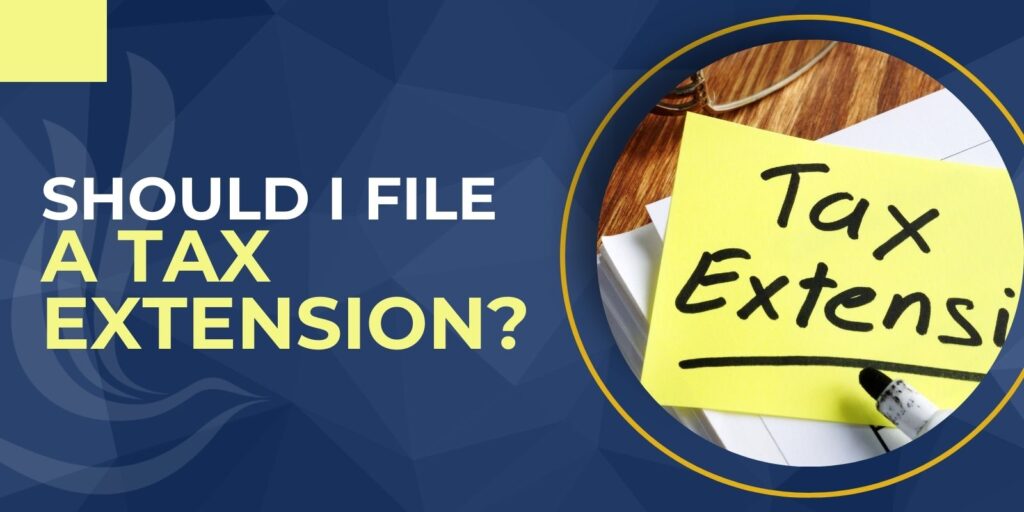Should I File a Tax Extension?

The tax filing deadline is just around the corner. If you need more time to prepare your tax return, you can file a tax extension. While a tax extension won’t give you more time to pay your taxes, it will allow a few more months to file your tax return without receiving a failure-to-file penalty. Here’s an overview of how tax extensions work and how to file one.
What is a Tax Extension?
The IRS allows taxpayers to file for a tax extension, which gives them more time to prepare their tax returns. If approved for a tax extension, the new tax deadline would be October 15, 2024. You can file for a tax extension for any reason, and the IRS will approve it as long as you submit Form 4868 by the April 15th tax deadline. While some states accept federal tax extension forms, others have their own requirements for obtaining an extension. Some states like California, Wisconsin, and Alabama offer automatic extensions, which means you don’t have to file a form. Other states require you to request an extension. You can check with your own state tax authority for more information on this.
Does a Tax Extension Delay My Tax Payments?
While a tax extension won’t delay the deadline to pay taxes, it will allow a few more months to file your tax return without receiving a failure-to-file penalty. That said, you might be wondering how much tax to pay if you aren’t sure how much you will owe, if any at all. In this case, you’ll need to estimate the amount of tax you will owe and pay that amount by April 15. If you do not, the IRS will begin to charge you interest on the balance owed, plus penalties. The failure-to-pay penalty is 0.5% of the tax owed after April 15, for every month or part of a month the tax remains unpaid, up to 25%.
Calculating Estimated Tax
To calculate your estimated tax payment, you’ll need to first calculate your taxable income and then subtract tax deductions, or the standard deduction. The amount leftover should be an estimate of your taxable income for the year. Then you can apply your tax rate determined by your tax bracket, which is based on your taxable income and filing status. This should help you find the amount of tax owed for the year.
Tax withholding should cover most, if not all, of this amount. If it does not, you can offset this amount by claiming tax credits you are eligible for. The tax remaining should be paid at the April tax deadline. If you overpay, you will receive a tax refund when you file before the October extension deadline. If you underpay, you could owe the balance, plus an underpayment penalty.
Tax Underpayment Penalty
The IRS underpayment penalty is a fee assessed on taxpayers who do not pay enough taxes during the tax year. While interest rates can change, the current rate for is 8% for individuals and 10% for corporations. There are a couple ways to avoid the underpayment penalty. The first is to owe less than $1,000 when you file your return. Alternatively, you could pay either 90% of the current year’s tax or 100% of last year’s tax, whichever is less. However, if your AGI exceeds $150,000, you should pay the lesser of 90% of the current year’s tax or 110% of last year’s tax. Doing so should help you avoid the underpayment penalty.
The IRS also offers underpayment waivers for some scenarios including:
- Taxpayers who were U.S. citizens or residents for the prior tax year and did not owe any taxes for that year
- Taxpayers who missed a required payment because of a casualty event, disaster, or other unusual circumstance
- The tax underpayment was a result of reasonable cause and not willful neglect
- Taxpayers who retired after reaching age 62 during the current or preceding tax year
- Taxpayers who became disabled during the tax year for which estimated payments were owed or during the preceding tax year
Should I File a Tax Extension?
If you are certain that you cannot file your tax return by the April 15 deadline this year, then you should at the very least file a tax extension before the tax deadline. This can immediately save you the trouble of dealing with a failure-to-file penalty. The current failure-to-file penalty can be up to 25% of the tax due. This penalty will not be charged if you file an extension, but it will be if you do not file a return by the extension deadline of October 15. Additionally, you should make sure you pay estimated taxes by the April 15 deadline to avoid the failure-to-pay penalty and the underpayment penalty.
Filing a tax extension can be very helpful if you are still awaiting important tax documents, need some documents corrected, or just simply do not have time to file before the deadline. If you are wondering if you should file an extension because you owe taxes and you are unable to pay, filing an extension may not be a good idea. Instead, you might consider getting a payment plan or installment agreement set up with the IRS. We know dealing with the IRS on your own can be intimidating. Optima Tax Relief has over a decade of experience helping taxpayers get back on track with their tax debt.
If You Need Tax Help, Contact Us Today for a Free Consultation